-
ORIGINAL ARTICLE12-16-2024
Construction and validation of an educational game on biosafety in the central sterile supply department
Revista Brasileira de Enfermagem. 2024;77(6):e20230478
Abstract
ORIGINAL ARTICLEConstruction and validation of an educational game on biosafety in the central sterile supply department
Revista Brasileira de Enfermagem. 2024;77(6):e20230478
DOI 10.1590/0034-7167-2023-0478
Views0See moreABSTRACT
Objectives:
to construct and validate an educational game on biosafety in the Central Sterile Supply Department of a hospital in Curitiba, PR.
Methods:
the study was conducted using a quantitative approach, employing applied and technological research with an exploratory design. The process was divided into six stages, from the definition of the theme to the validation and application of the game. The study was carried out from May to August 2022, involving 17 nursing professionals from a Central Sterile Supply Department during day and night shifts, as well as 9 judges.
Results:
the study resulted in the construction of a board game named by the authors as “My Health First.”
Conclusions:
the research achieved its objective of constructing and validating an educational game. By reflecting on professional practice and correlating the occupational risks present, the professionals were able to list safe actions, identify problems, and seek solutions.

-
ORIGINAL ARTICLE12-16-2024
Health literacy development of Primary Health Care patients: qualitative research
Revista Brasileira de Enfermagem. 2024;77(6):e20240154
Abstract
ORIGINAL ARTICLEHealth literacy development of Primary Health Care patients: qualitative research
Revista Brasileira de Enfermagem. 2024;77(6):e20240154
DOI 10.1590/0034-7167-2024-0154
Views0See moreABSTRACT
Objectives:
to identify the process of health literacy development among primary care patients, relating it to their self-care practices.
Methods:
qualitative, prospective research with 22 patients from two Family Health Strategy units. Data were obtained through individual semi-structured interviews, examined through descriptive statistics and thematic content analysis.
Results:
the results discuss how participants learn about health and how this resonates in their behaviors, culminating in two thematic categories: “Health knowledge construction”; and “Dialogue between health knowledge construction and patient care actions”.
Final Considerations:
health knowledge is developed mainly through interpersonal relationships, mediated by health professionals through bonding and communication. Community educational actions and training of health professionals in communication can promote health literacy and self-care among patients.

-
ORIGINAL ARTICLE12-16-2024
Analysis of omission of antimicrobial doses in Intensive Care Units
Revista Brasileira de Enfermagem. 2024;77(6):e20240102
Abstract
ORIGINAL ARTICLEAnalysis of omission of antimicrobial doses in Intensive Care Units
Revista Brasileira de Enfermagem. 2024;77(6):e20240102
DOI 10.1590/0034-7167-2024-0102
Views0See moreABSTRACT
Objectives:
to analyze the rate of antimicrobial dose omission in intensive care units.
Methods:
cross-sectional study carried out between March 1 and September 30, 2023, in intensive care units of a University Hospital in Rio de Janeiro.
Results:
the sample consisted of 452 prescriptions and 1467 antimicrobial doses. The dose omission rate was 4.29%. Each antimicrobial prescribed increased the chance of omission by 51%. The strategy of double-checking prescriptions helped prevent 30% of antimicrobial dose omissions (p=0.0001).
Conclusions:
monitoring the omission of antimicrobial doses can guide nursing actions to improve quality and patient safety, contributing to the prevention of medication errors, antimicrobial stewardship and the fight against antimicrobial resistance.
-
REVIEW12-16-2024
Recommendations for guidelines for promoting mental health in the workplace: an umbrella review
Revista Brasileira de Enfermagem. 2024;77(6):e20240086
Abstract
REVIEWRecommendations for guidelines for promoting mental health in the workplace: an umbrella review
Revista Brasileira de Enfermagem. 2024;77(6):e20240086
DOI 10.1590/0034-7167-2024-0086
Views1See moreABSTRACT
Objectives:
to summarize the recommendations of guidelines for promoting mental health in the workplace.
Methods:
an umbrella review, according to Joanna Briggs Institute and Preferred Reporting Items for Systematic reviews and Meta-Analyses methodological assumptions. Data collection was carried out in January 2021 and updated in July 2023 in the American Psychological Association, Cochrane Library, EMBASE, National Library of Medicine, and Scopus databases. Systematic reviews that assessed guidelines with recommendations for mental health care for workers were included. PROSPERO registration CRD42023461845.
Results:
four systematic reviews published between 2015 and 2018 were identified. The abstracts highlighted actions that facilitate and inhibit the recommendations as well as three categories of intervention: primary prevention – worker protection; secondary prevention – promoting workers’ mental health; and tertiary prevention – supporting, monitoring and rehabilitating workers upon returning to work.
Conclusions:
the interventions are based on prevention, promotion and early recognition, support and rehabilitation of mental health problems.

-
ORIGINAL ARTICLE12-16-2024
Psychometric analysis of ProQOL-BR in nursing: building hospital safety and protection
Revista Brasileira de Enfermagem. 2024;77(6):e20240085
Abstract
ORIGINAL ARTICLEPsychometric analysis of ProQOL-BR in nursing: building hospital safety and protection
Revista Brasileira de Enfermagem. 2024;77(6):e20240085
DOI 10.1590/0034-7167-2024-0085
Views0See moreABSTRACT
Objectives:
to analyze the psychometric properties of the ProQOL-BR instrument in hospital nursing professionals.
Methods:
a methodological study to validate the ProQOL-BR. Confirmatory factor analysis, assessment of local and global adjustment quality, Pearson hypothesis testing and Cronbach’s alpha internal consistency analysis were used.
Results:
a total of 490 professionals participated. The model presents adequate quality due to factor weights (λ≥ 0.40), acceptable overall fit quality and adequate chi-square ratio and degrees of freedom (χ2/g.1=2.51) for the parameters of CFI (0.923), GFI (0.902), TLI (0.914) and RMSEA (0.042). In terms of validity, it was shown to be adequate with CC=0.89. The internal consistency obtained by standardized Cronbach’s alpha was 0.761. Criterion validity was shown to be favorable with significant correlations (0.001).
Conclusions:
the instrument was validated regarding content, criteria and reliability. Three questions were removed from the original instrument, ProQOL-BR, leaving the final instrument with 25 questions.

-
12-16-2024
GerenciaDOR™: development of digital technology by nurses for the assessment of patients with chronic pain
Revista Brasileira de Enfermagem. 2024;77(6):e20240050
Abstract
GerenciaDOR™: development of digital technology by nurses for the assessment of patients with chronic pain
Revista Brasileira de Enfermagem. 2024;77(6):e20240050
DOI 10.1590/0034-7167-2024-0050
Views0See moreABSTRACT
Objectives:
to develop a digital technological solution (prototype) for assessing patients with chronic pain.
Methods:
this is a methodological and technological development study based on the Human-Centered Design framework and the principles of Patient-Centered Care. The prototype guides patients through a body diagram and directs them to an evaluation using specific instruments that address the multidimensional aspects of chronic pain.
Results:
the GerenciaDOR* project enables navigation through the Web App screens, providing access to pain assessment features up to the presentation of results.
Final Considerations:
the study describes a systematic approach to pain assessment and expands nurses’ knowledge in pain management. Additionally, it can promote the development of other digital technologies for chronic pain assessment and contribute to a multidisciplinary, patient centered treatment.

-
ORIGINAL ARTICLE12-16-2024
Respectful care for postpartum women with sickle cell disease: a netnographic study
Revista Brasileira de Enfermagem. 2024;77(6):e20230545
Abstract
ORIGINAL ARTICLERespectful care for postpartum women with sickle cell disease: a netnographic study
Revista Brasileira de Enfermagem. 2024;77(6):e20230545
DOI 10.1590/0034-7167-2023-0545
Views1See moreABSTRACT
Objectives:
to analyze principles of respectful maternity care in narratives of postpartum women with sickle cell disease, relating them to Sustainable Development Goals.
Methods:
netnographic study, with two videos published in 2020. Deductive iconographic and thematic analysis by Respectful Maternity Care Charter, organized in MAXQDA.
Results:
principles identified were the right to: freedom from harm and ill-treatment; information, informed consent, refusal of medical procedures, and respect for their choices and preferences including companion; be considered a person from birth, with dignified and respectful treatment; health at the highest possible level; newborns being with their parents or guardians. The Sustainable Development Goals for women by 2030 were not positively contemplated in postpartum women’s experience.
Final Considerations:
it is appropriate that health workers qualify themselves to provide respectful maternity care, with qualified listening, understanding, and resolution of unique demands of postpartum women with sickle cell disease, seeking equality in care for women.

-
REVIEW12-16-2024
Strategies for expanding vaccination coverage in children in Brazil: systematic literature review
Revista Brasileira de Enfermagem. 2024;77(6):e20230343
Abstract
REVIEWStrategies for expanding vaccination coverage in children in Brazil: systematic literature review
Revista Brasileira de Enfermagem. 2024;77(6):e20230343
DOI 10.1590/0034-7167-2023-0343
Views1See moreABSTRACT
Objectives:
to identify the strategies found in the literature for increasing vaccination coverage among children in Brazil. It is justified mainly by the current scenario of falling vaccination coverage.
Methods:
systematic literature review. The search was carried out in the Pubmed (MEDLINE), Embase and Scopus databases, following the PRISMA guidelines.
Results:
initially, 4,824 results were returned. In the end, 6 studies were included for narrative synthesis using the SWiM methodology. Of these, 50% dealt with studies related to the Bolsa Família Program (PBF). The others explored strategies for approaching parents directly, Rapid Vaccination Monitoring (MRV) and the Community Health Agents Program (PACS). The PBF did not guarantee compliance with the conditionality of keeping vaccinations up to date. The MRV and PACS are effective strategies, especially because they allow active search for absentees.
Conclusions:
we conclude that more publications are needed on strategies to increase vaccination coverage among children in Brazil.

-
ORIGINAL ARTICLE11-22-2024
Transitions experienced by people living with limitations resulting from leprosy: a research-care study
Revista Brasileira de Enfermagem. 2024;77(5):e20230229
Abstract
ORIGINAL ARTICLETransitions experienced by people living with limitations resulting from leprosy: a research-care study
Revista Brasileira de Enfermagem. 2024;77(5):e20230229
DOI 10.1590/0034-7167-2023-0229
Views0See moreABSTRACT
Objective:
to understand the transitional processes that affect the adaptation of people who live with limitations resulting from leprosy.
Methods:
This is a qualitative study based on the precepts of Transition Theory, mediated by care-research, with 24 people with limitations resulting from leprosy in an ex-hospital colony in Piauí. Semi-structured interviews were carried out. The interviews were analyzed using Iramuteq software.
Results:
the researched-caregivers experienced the four types of transitions, including feelings of fear, worry, loneliness, hopelessness, guilt and a tendency to hide the diagnosis. Breakdowns and resignation were revealed, with spirituality, adaptation to the new life situation and acceptance as facilitating conditions for coping with the transitional process, with a consequent improvement in quality of life.
Final considerations:
the transitional processes had a positive significance, since they contributed to adaptation and the achievement of quality of life.
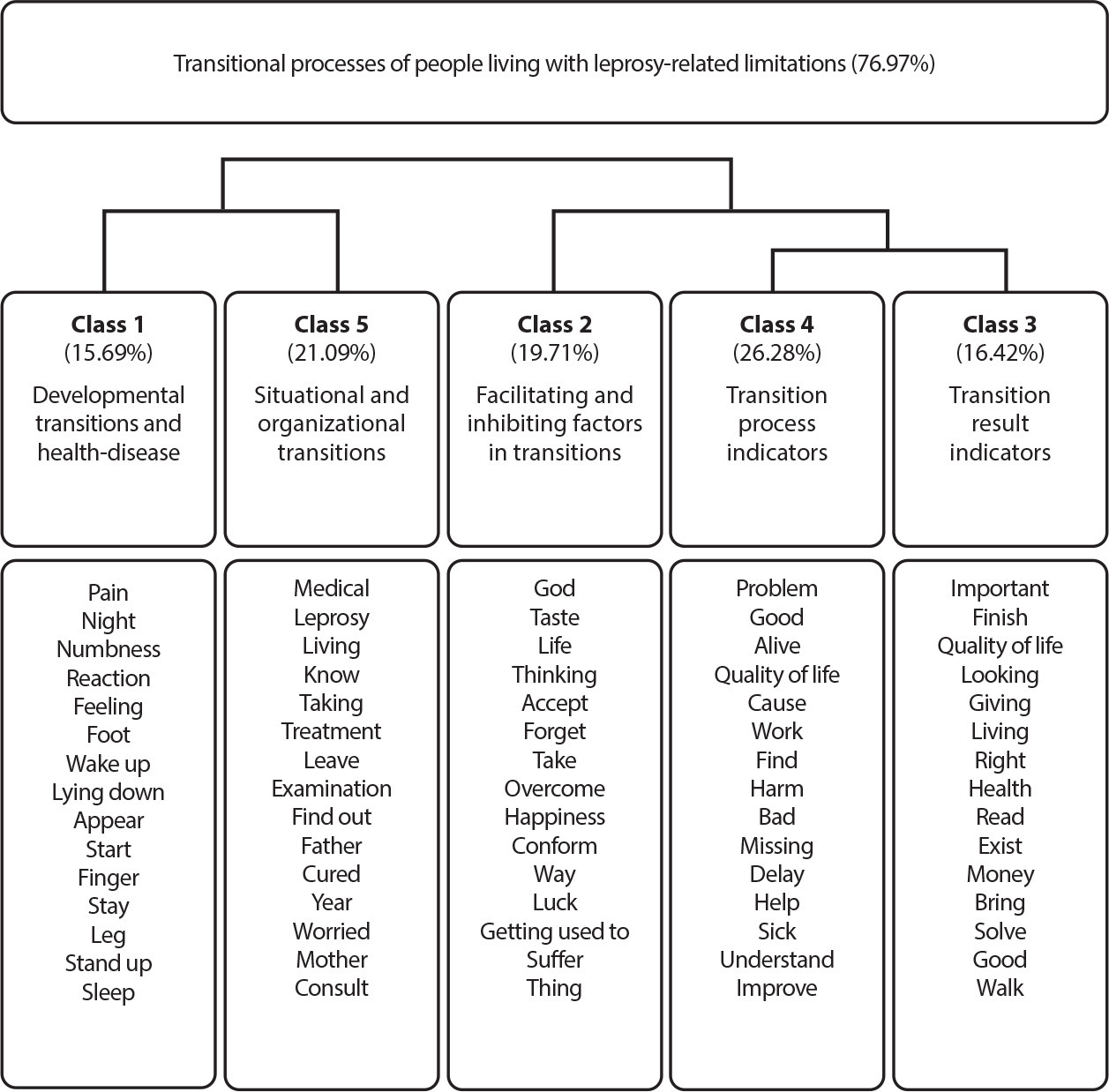
-
ORIGINAL ARTICLE10-25-2024
Analysis of the vaccination situation against Mpox in people living with HIV/AIDS: an ecological study
Revista Brasileira de Enfermagem. 2024;77(5):e20230234
Abstract
ORIGINAL ARTICLEAnalysis of the vaccination situation against Mpox in people living with HIV/AIDS: an ecological study
Revista Brasileira de Enfermagem. 2024;77(5):e20230234
DOI 10.1590/0034-7167-2023-0234
Views0See moreABSTRACT
Objectives:
to analyze the vaccination situation against Mpox in people living with HIV/AIDS in Brazil.
Methods:
an ecological study on the vaccination status against Mpox in people living with HIV/AIDS (PLWHA) in Brazil. The data were collected in April 2023 through information from the Ministry of Health, using the “Microsoft app Power BI,” which is publicly accessible.
Results:
the data analysis revealed that in Brazil, 2,978 doses of the MVA-BN Jynneos Mpox vaccine were administered in PLWHA, resulting in a vaccination coverage of 18.3%, with the southern and southeastern regions showing the lowest and highest vaccination coverage, respectively. Gender-based evaluation showed a higher proportion of vaccinated males.
Conclusions:
we identified low vaccination coverage in all regions of Brazil, highlighting the need for intensified vaccination activities, especially for PLWHA.
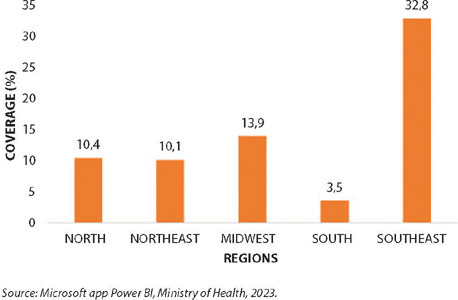
-
ORIGINAL ARTICLE12-13-2024
Adaptation and implementation of a Nursing care protocol for children in the Amazon Region
Revista Brasileira de Enfermagem. 2024;77(5):e20230245
Abstract
ORIGINAL ARTICLEAdaptation and implementation of a Nursing care protocol for children in the Amazon Region
Revista Brasileira de Enfermagem. 2024;77(5):e20230245
DOI 10.1590/0034-7167-2023-0245
Views0See moreABSTRACT
Objectives:
to describe the process of implementing an adapted protocol for pediatric nursing care in a health unit located in a municipality in the Amazon Region.
Methods:
methodological research conducted in a basic health unit with four family health teams in the state of Rondônia, involving seven nursing professionals. Data collection occurred between October 2020 and April 2022, following the research phases: situational diagnosis, exploratory phase, protocol definition, implementation, and evaluation.
Results:
the outcome was the adaptation and implementation of a nursing care protocol for children.
Final Considerations:
the adaptation and implementation process can be an effective approach to improving care, strengthening nursing as a profession with a solid foundation in scientific and clinical evidence. This facilitates early problem identification and appropriate guidance, leading to better health outcomes for children.
-
ORIGINAL ARTICLE11-22-2024
Knowledge sharing: nurse managers’ practices
Revista Brasileira de Enfermagem. 2024;77(5):e20230287
Abstract
ORIGINAL ARTICLEKnowledge sharing: nurse managers’ practices
Revista Brasileira de Enfermagem. 2024;77(5):e20230287
DOI 10.1590/0034-7167-2023-0287
Views0See moreABSTRACT
Objective:
To analyze how management practices for sharing knowledge are developed in public hospitals in the context of nursing.
Methods:
Qualitative research, carried out with 15 nurse managers from six public hospitals, from July to September 2022. Data were collected through semi-structured interviews and analyzed according to content analysis and in a model for sharing knowledge at work.
Results:
Knowledge sharing in nursing occurs through intraand extra-organizational training (training, courses and events), use of digital communication tools (media and social networks) and individual and collective contact between professionals during the service (experiences, exchange of experiences and assessment feedback).
Final considerations:
Sharing knowledge is relevant to nursing work. To improve it, it must be understood that effective sharing occurs from person to person, in their daily practices, and must be conducted as a strategically planned process by nurse managers.
-
ORIGINAL ARTICLE10-07-2024
Development and validation of a mobile application prototype for postoperative cardiac surgery
Revista Brasileira de Enfermagem. 2024;77(5):e20230491
Abstract
ORIGINAL ARTICLEDevelopment and validation of a mobile application prototype for postoperative cardiac surgery
Revista Brasileira de Enfermagem. 2024;77(5):e20230491
DOI 10.1590/0034-7167-2023-0491
Views0See moreABSTRACT
Objectives:
to develop and validate the content, appearance, and semantics of a prototype application for monitoring patients in the postoperative period of cardiac surgery.
Methods:
this is a technological development study based on Contextualized Instructional Design. The content and appearance evaluation was conducted by a committee of specialists, and semantic validation was carried out by patients from a cardiac surgery outpatient clinic.
Results:
the application prototype consisted of 43 screens, validated by 17 health specialists, with content validity ratio and appearance validity index results of 0.86 and 0.99, respectively. For semantic validation, 10 patients participated in data collection, with a total content validity index of 0.978.
Conclusions:
the prototype of the “VivaCor PósOp” application demonstrated evidence of content, appearance, and semantic validity, with the potential to stimulate self-care in patients in the postoperative period of cardiac surgery.
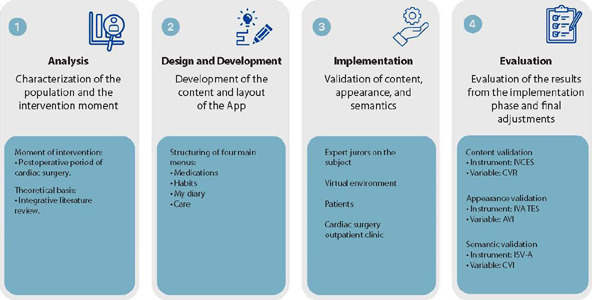
-
ORIGINAL ARTICLE10-07-2024
Indicators of emotional distress and mindfulness in undergraduate students: a cross-sectional study
Revista Brasileira de Enfermagem. 2024;77(5):e20230499
Abstract
ORIGINAL ARTICLEIndicators of emotional distress and mindfulness in undergraduate students: a cross-sectional study
Revista Brasileira de Enfermagem. 2024;77(5):e20230499
DOI 10.1590/0034-7167-2023-0499
Views0See moreABSTRACT
Objectives:
to assess the association between indicators of emotional distress and dispositional mindfulness in health students at a Brazilian federal public university.
Methods:
a cross-sectional study, developed with university students in the health area of a public institution from May to June 2022. In the analysis, multiple linear regression was used using SPSS software.
Results:
the sample was mostly female, ≤ 22 years old, non-white, studying the first semesters, with a higher prevalence for the medicine course. Students presented moderate dispositional mindfulness scores. It was observed that the variables of stress, depression and current suicide risk were associated with the capacity for mindfulness.
Conclusions:
knowing the indicators of emotional distress that are related to the potential of mindfulness can contribute as a situational diagnosis to better design strategies that promote the improvement of emotional indicators of health students.
-
ORIGINAL ARTICLE12-13-2024
Nurses’ experience regarding patient safety in mobile pre-hospital care
Revista Brasileira de Enfermagem. 2024;77(5):e20230529
Abstract
ORIGINAL ARTICLENurses’ experience regarding patient safety in mobile pre-hospital care
Revista Brasileira de Enfermagem. 2024;77(5):e20230529
DOI 10.1590/0034-7167-2023-0529
Views0See moreABSTRACT
Objectives:
to understand nurses’ experience regarding patient safety in mobile pre-hospital care.
Method:
a qualitative, exploratory and descriptive study, conducted with nurses active in mobile pre-hospital care services. Semi-structured interviews were conducted, audio-graved and submitted to Bardin’s content analysis.
Results:
from four thematic categories established, nurses reported the care and management skills necessary to work in this service. They demonstrated a commitment to ensuring safe care for patients, staff and spectators. They highlighted the actions taken to prevent and mitigate incidents. However, they based their experiences on practice protocols and individual actions, expressing the need to improve knowledge about patient safety.
Final Considerations:
mobile pre-hospital care nurses’ experience in relation to patient safety was limited, suggesting the need for training on the subject, alignment of work processes and implementation of strategies, aiming to guarantee safe care.
-
ORIGINAL ARTICLE12-13-2024
Knowledge and attitudes of nursing students regarding the sexuality of older adults: a quasi-experimental study
Revista Brasileira de Enfermagem. 2024;77(5):e20240011
Abstract
ORIGINAL ARTICLEKnowledge and attitudes of nursing students regarding the sexuality of older adults: a quasi-experimental study
Revista Brasileira de Enfermagem. 2024;77(5):e20240011
DOI 10.1590/0034-7167-2024-0011
Views0See moreABSTRACT
Objectives:
to compare the knowledge and attitudes of nursing students regarding sexual behavior and sexually transmitted infections (STIs) in older adults before and after an educational intervention.
Methods:
this quasi-experimental study involved a convenience sample of 45 nursing students from a public university, conducted in three stages: pre-intervention, intervention, and post-intervention. A questionnaire was used to assess sociodemographic characteristics, academic training, and knowledge and attitudes on the topic. The intervention was an educational web conference. Paired t-test and Wilcoxon test were used for data analysis.
Results:
there was a statistically significant difference in the knowledge and attitude scores of nursing students before and after the educational intervention (p < 0.001). A significant increase was observed in the knowledge score (from 9.3 to 12.2) and attitude score (from 108 to 117.2) in the post-intervention phase.
Conclusions:
the knowledge of nursing students regarding the sexuality of older adults increased after the educational intervention, and their attitudes on the subject became more positive.

-
ORIGINAL ARTICLE06-24-2022
Factors associated with the incidence of pressure wounds in critical patients: a cohort study
Revista Brasileira de Enfermagem. 2022;75(6):e20210267
Abstract
ORIGINAL ARTICLEFactors associated with the incidence of pressure wounds in critical patients: a cohort study
Revista Brasileira de Enfermagem. 2022;75(6):e20210267
DOI 10.1590/0034-7167-2021-0267
Views0See moreABSTRACT
Objectives:
to identify the incidence of pressure wound in critical patients and its associated factors.
Methods:
retrospective cohort study, based on the analysis of 369 critical patients’ records. Descriptive and inferential statistics were used, as well as logistic regression.
Results:
the incidence of pressure wounds was 11.4%. Patients who had been hospitalized for four days or more (OR 2.99; CI95% 1.15-7.78), used nasoenteric tubes (OR: 3.81; CI95%: 1.4010.38), vesical drainage catheters (OR: 4.78; CI95%: 1.31-17.38) and tracheostomy (OR: 3.64; CI95%: 1.48-8.97) had a higher chance of developing pressure wounds. The mean score of the Braden scale among participants who developed (14.2 points) pressure wounds was statistically different (p<0.001) than that of those who did not (12.3 points).
Conclusions:
the incidence of pressure wounds was associated with a higher time in the unit, the use of nasoenteric tubes, vesical drainage catheters, and tracheostomies were associated with a higher time of hospitalization in the unit.
-
ORIGINAL ARTICLE09-09-2022
Primary care nurses’ learning styles in the light of David Kolb
Revista Brasileira de Enfermagem. 2022;75(6):e20210986
Abstract
ORIGINAL ARTICLEPrimary care nurses’ learning styles in the light of David Kolb
Revista Brasileira de Enfermagem. 2022;75(6):e20210986
DOI 10.1590/0034-7167-2021-0986
Views0See moreABSTRACT
Objectives:
to identify primary care nurses’ learning styles in the light of David Kolb’s Experiential Learning Theory.
Methods:
a descriptive and exploratory qualitative study. A semi-structured interview script was used for data collection and content analysis for data processing.
Results:
primary care nurses showed different learning styles: diverging, which combines active experimentation and reflective observation; assimilating, which combines reflective observation and abstract conceptualization; converging, which associates abstract conceptualization and concrete experience; and accommodating, which unites concrete experience and active experimentation.
Final Considerations:
learning through experience requires that knowledge be understood and transformed. Nurses learn in different ways, as they have different learning styles. Therefore, recognizing nurses’ learning styles is important to foster ongoing professional development and ensure safe nursing care.
-
ORIGINAL ARTICLE11-26-2022
Mental health assistance in Primary Care: the perspective of professionals from the Family Health Strategy
Revista Brasileira de Enfermagem. 2022;75:e20190326
Abstract
ORIGINAL ARTICLEMental health assistance in Primary Care: the perspective of professionals from the Family Health Strategy
Revista Brasileira de Enfermagem. 2022;75:e20190326
DOI 10.1590/0034-7167-2019-0326
Views0See moreABSTRACT
Objective:
To learn about the perceptions of the professionals who work in Primary Health Care about mental health care.
Methods:
Descriptive and qualitative study, carried out with 29 health workers through open and individual interviews. The IRaMuTeQ® software was used to organize the data which, then, was submitted to a content analysis process in the thematic modality.
Results:
Three classes emerged from the content analysis: “Perceptions about the mental health care provided in the city”, “The biomedical paradigm in mental healthcare”, and “Elements for the construction of a new way for professionals to act in mental health”.
Final considerations:
It was found that, despite the good infrastructure of the services and the elements pointed at by the professionals to create a new way to act, they do not do so, and the responsibility falls, mostly, on the psychologist to carry out these activities.
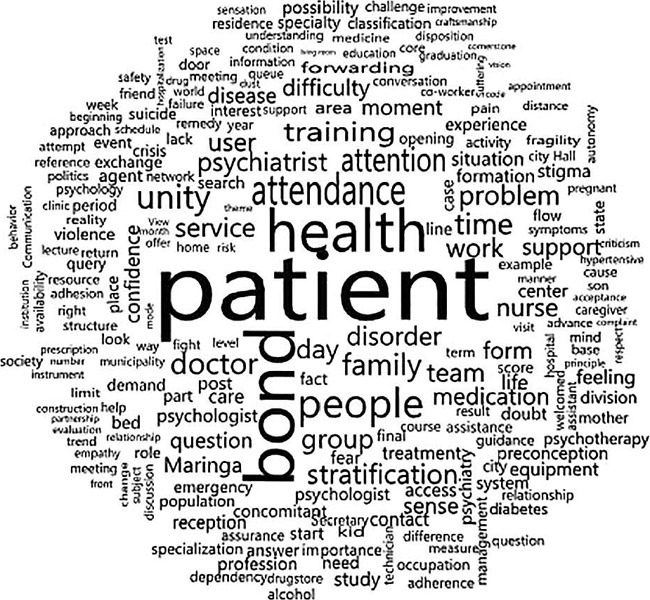
-
ORIGINAL ARTICLE10-25-2022
COVID-19 pandemic and nursing week: analysis from software Iramuteq
Revista Brasileira de Enfermagem. 2022;75:e20200690
Abstract
ORIGINAL ARTICLECOVID-19 pandemic and nursing week: analysis from software Iramuteq
Revista Brasileira de Enfermagem. 2022;75:e20200690
DOI 10.1590/0034-7167-2020-0690
Views0See moreABSTRACT
Objective:
to analyze the themes of publications on the Federal Council of Nursing (Cofen) website during Nursing Week 2020.
Method:
documentary, qualitative research, whose data sources were publications on the Cofen website from May 12 to 20, 2020. Data were processed by software IRAMUTEQ®, through the Descending Hierarchical Classification and analyzed under the historical materialism framework.
Results:
thirty publications were analyzed, giving rise to five classes.
Final considerations:
the themes published in the period investigated pointed to the grief experienced by the category, due to the death of its members, and the fight for better working conditions. Overcoming the pandemic involves recognizing science and the Unified Health System, protecting nursing workers’ health and fighting misinformation and fake news.
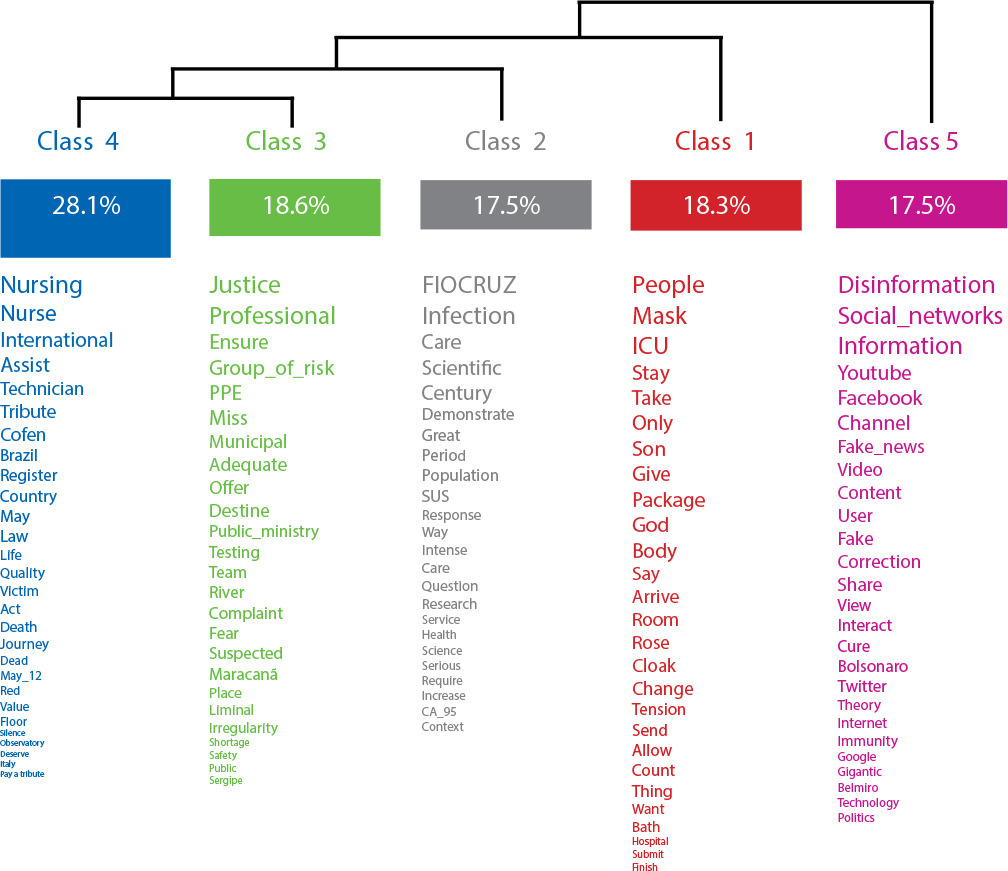
-
REFLECTION09-29-2022
Hemodialysis in the context of COVID-19: care, nursing protagonism and quality
Revista Brasileira de Enfermagem. 2022;75:e20201077
Abstract
REFLECTIONHemodialysis in the context of COVID-19: care, nursing protagonism and quality
Revista Brasileira de Enfermagem. 2022;75:e20201077
DOI 10.1590/0034-7167-2020-1077
Views0See moreABSTRACT
Objective:
To reflect on the need to reorganize satellite dialysis units to ensure the safety of patients and workers, focusing on minimizing the risk of contamination by SARS-CoV-2.
Methods:
Reflection considering the guidelines of international and Brazilian institutions and scientific articles, with a view to possible adaptations to the Brazilian reality.
Results:
The actions suggested and adapted by Dialysis Units from different countries during the pandemic focus on the quality of care and safety of the patient and workers. There was an opportunity to reflect on these actions using the Donabedian Model for quality of care and highlight the nursing team’s role in this context.
Final considerations:
The focus on quality and safety related to institutionalized processes and the assessment through indicators can contribute to the management of the outpatient dialysis unit in the context of COVID 19.
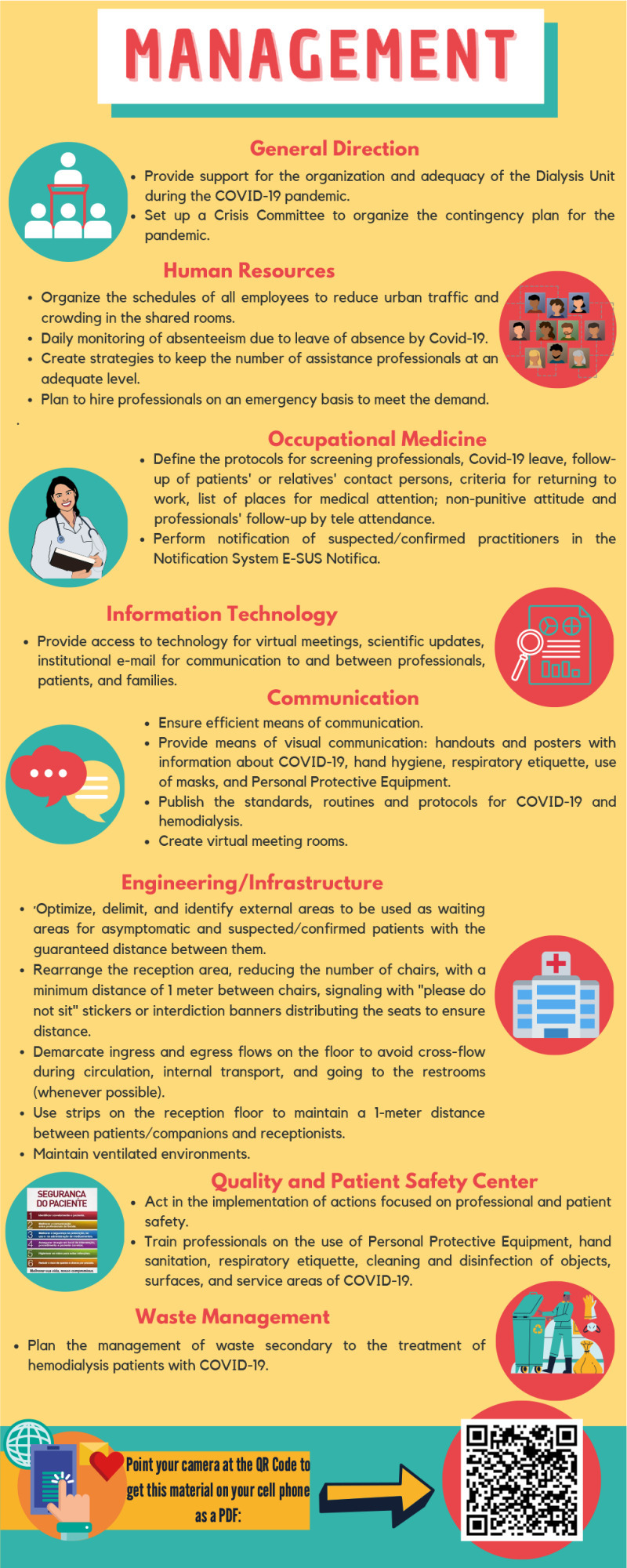
-
ORIGINAL ARTICLE11-29-2022
Reflections on nursing and COVID-19 in light of health education
Revista Brasileira de Enfermagem. 2022;75:e20201305
Abstract
ORIGINAL ARTICLEReflections on nursing and COVID-19 in light of health education
Revista Brasileira de Enfermagem. 2022;75:e20201305
DOI 10.1590/0034-7167-2020-1305
Views0See moreABSTRACT
Objective:
To reflect on the nursing and pandemic of COVID-19 considering health education, health promotion, and the Ottawa Charter action areas.
Methods:
A theoretical-reflexive study on health education and health promotion concepts and the areas of action presented in the Ottawa Charter.
Results:
Educational actions are present in the contexts of epidemics and pandemics, as well as in the work of nurses, who need to be increasingly based on dialogue and individual and collective empowerment to enable users to adopt healthy and preventive behaviors – in this case, concerning COVID19. However, this professional needs effective and efficient public policy actions and measures based on scientific assumptions of health promotion. Final considerations: The actions of health education need to be increasingly valued because knowledge can be considered the first “vaccine” to combat any pandemic.

-
REVIEW10-18-2022
Decision making by health professionals during COVID-19: an integrative review
Revista Brasileira de Enfermagem. 2022;75:e20210067
Abstract
REVIEWDecision making by health professionals during COVID-19: an integrative review
Revista Brasileira de Enfermagem. 2022;75:e20210067
DOI 10.1590/0034-7167-2021-0067
Views1See moreABSTRACT
Objective:
To analyze the scientific production on the decision making of health workers during the COVID-19 pandemic.
Methods:
Integrative review in the databases CINAHL, MEDLINE, Scopus, ScienceDirect, WoS, and BVS. Inclusion criteria: original articles available in full, in any language, related to the object investigated.
Results:
During this pandemic, health workers have been making decisions based on ethical/bioethical principles (utility, beneficence, non-maleficence, autonomy, justice, proportionality, flexibility, clinical prognosis, duration of the need, and fair health attention), values (solidarity, equality, equity, utilitarianism, relational autonomy, reliability, reciprocity, maximization of the benefits and resources, and prioritization of those in worse conditions), beliefs and personal motivation, protocols, directives, tools, algorithms, recommendations, and criteria.
Final considerations:
Decision making has never been so necessary as in this pandemic. This article is not a recipe for the professionals, since decision making is based on numerous factors. However, it provides them with a foundation that can be helpful in this difficult process.

-
REVIEW08-26-2022
Health literacy of adolescents in the COVID-19 pandemic: an integrative review
Revista Brasileira de Enfermagem. 2022;75:e20210956
Abstract
REVIEWHealth literacy of adolescents in the COVID-19 pandemic: an integrative review
Revista Brasileira de Enfermagem. 2022;75:e20210956
DOI 10.1590/0034-7167-2021-0956
Views0See moreABSTRACT
Objective:
to analyze the scientific production on health literacy (HL) of adolescents during the COVID-19 pandemic.
Method:
an integrative review, in the MEDLINE, LILACS, CINAHL and Web of Science databases, between March 2020 and August 2021. Original articles in English, Spanish and Portuguese were included.
Results:
of the 65 studies found in the search, eight were included for analysis, with no publication in Brazil, with five publications in 2021, predominantly in English (n=7) and all classified with level of evidence VI. Of the instruments used, eHealth literacy was the most applied instrument (n=2). Television, family and the internet were identified as the main sources of health information during the pandemic.
Final considerations:
the literature has indicated that HL can interfere with adolescents’ decision making and that a low HL can lead to decisions and physical and mental exposure actions of adolescents.
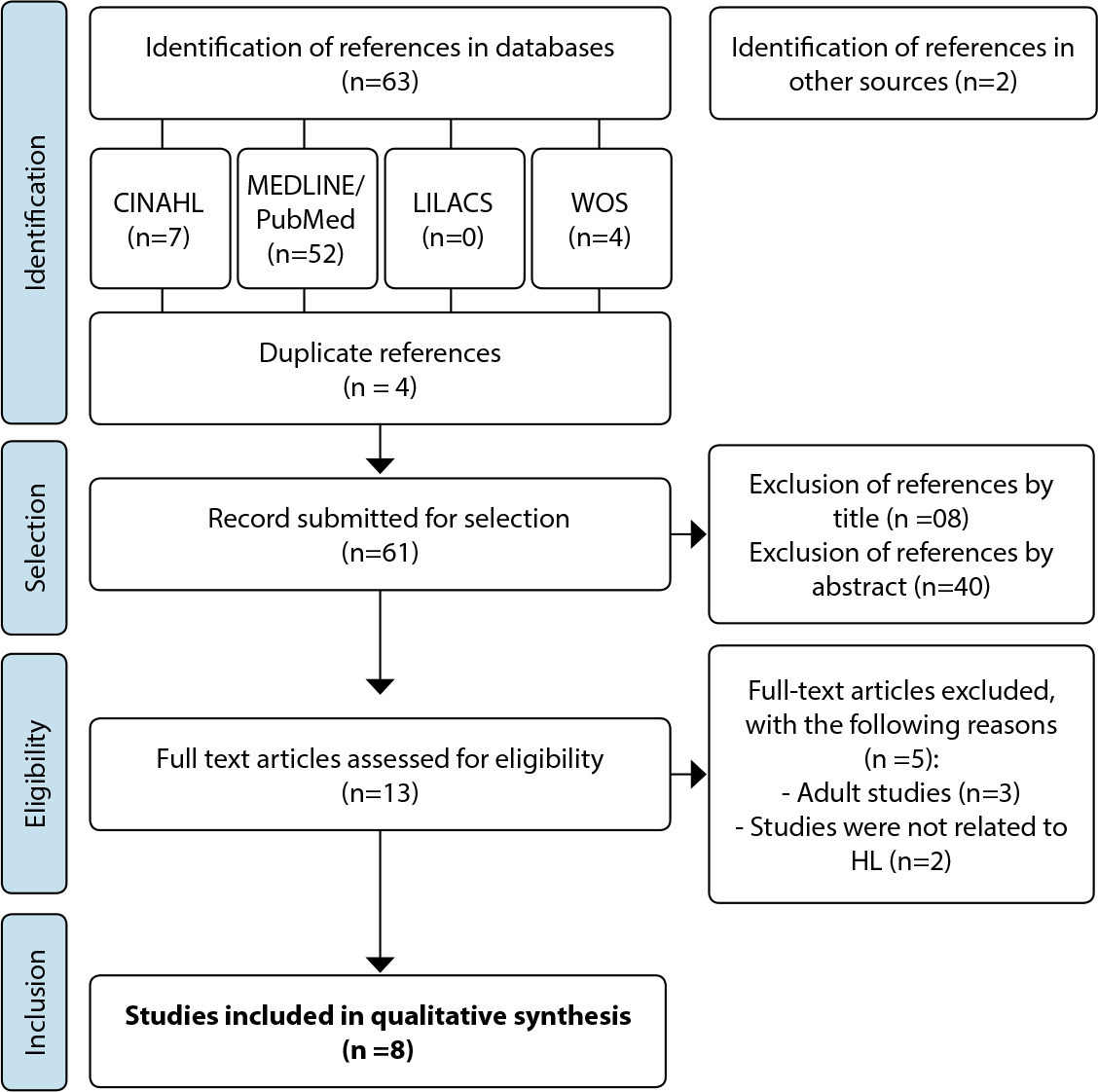
Search
Search in:
Nuvem de Tags
Enfermagem (930)Cuidados de Enfermagem (269)Atenção Primária à Saúde (239)Idoso (208)Educação em Enfermagem (151)Segurança do Paciente (150)Saúde Mental (145)Educação em Saúde (139)Estudos de Validação (131)Qualidade de Vida (104)Tecnologia Educacional (100)Promoção da Saúde (99)COVID-19 (91)Criança (91)Família (87)Enfermagem Pediátrica (86)Saúde do Trabalhador (86)Adolescente (85)Saúde Pública (82)Estudantes de Enfermagem (77)




